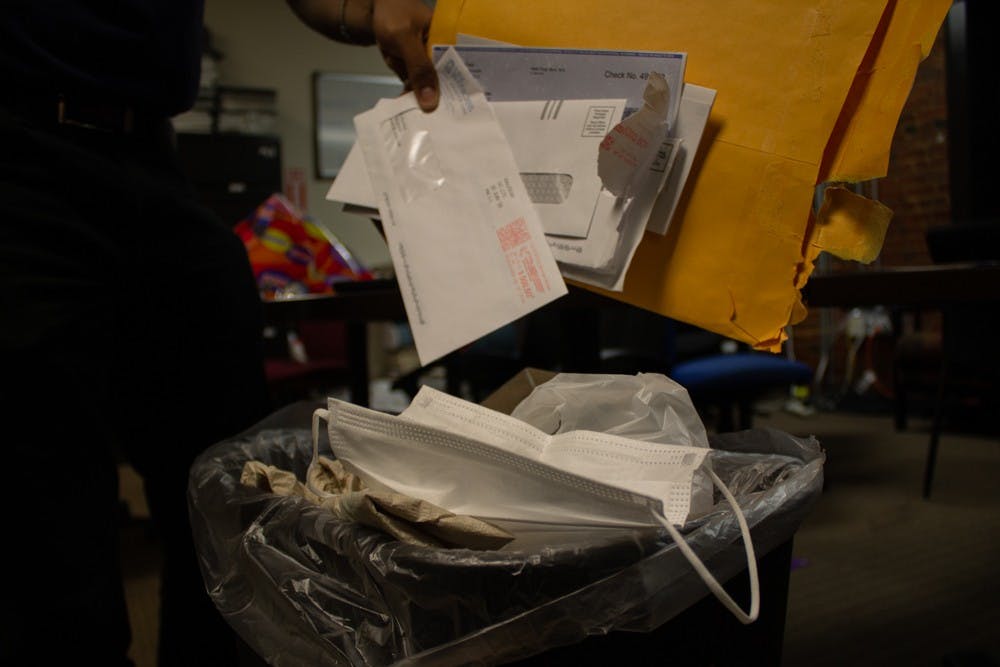“Nash’s position continues to be that it’s just not responsible for its providers, which isn’t the law,” Weber said. “If they’re providing services through a contractor or similar arrangement, they’re responsible for ensuring that they all comply with the law, which makes sense because we don’t want entities to contract away civil rights obligations.”
Miles, the Chapel Hill resident, regularly seeks medical care through several UNC Health Care practices. According to the complaint, he sees a provider at least once every six months and visited three providers between June and August 2018.
To read written communications, Miles depends on large print or electronic documents that he can enlarge. Although he requested large print documents from staff, Miles repeatedly received forms, visit summaries, bills and discharge instructions in standard print from UNC Health Care providers.
On several occasions when Miles asked about alternatively formatted bills, the UNC Health Care billing department informed him that it doesn't provide bills in large print. Another time, he was told the department would “look into it” but he never heard back, according to the complaint.
UNC Health Care did mail Miles large print documents "related to some recent visits" with its providers, according to the complaint, after Miles' lawyer wrote them a letter on the issue. However, following that attorney letter, Miles was again denied large print documents during two later visits in mid-October last year — just weeks before the complaint was filed.
At the end of one visit, a staff member attempted to read aloud his follow-up instructions that were in standard print. Miles wasn’t feeling well, the complaint states, and couldn’t remember the information later on.
The complaint said Miles doesn’t want to rely on other people to communicate his medical information to him, as it invades his privacy, and he wants to be able to access the entirety of his information — not just a summary of a document read by staff.
“Not being able to independently and privately get the information you need to know for your health is really troubling,” Weber said. “It leaves people either in a situation of just remaining in the dark and not knowing what’s going on, or having to disclose really private, often pretty sensitive information to third parties to be able to access documents.”
'We can’t sit on our civil rights forever'
Before filing the original complaint in December 2018, Weber said the NFB and Disability Rights NC offered to collaborate with UNC Health Care to create solutions regarding accessible practices for blind patients.
Weber said UNC Health Care refused the offer, responding that the matter would be solved internally. Since Miles continued to seek medical treatment from UNC Health Care and continued to receive inaccessible documents, the plaintiffs moved forward to file the lawsuit.
“We remain ready to work with UNC and Nash to resolve these issues, but we can’t sit on our civil rights forever,” she said.
To get the day's news and headlines in your inbox each morning, sign up for our email newsletters.
Since the complaint's filing, UNC and Nash have repeatedly asked judges to dismiss the case. In September, a magistrate judge recommended that a district court move forward with the complaint and deny the defendants' motion to dismiss all claims, including compensatory damages, except one: Bone’s request for injunctive relief against Nash.
Bone requested that Nash change their official policies and practices which relate to providing accessible materials to blind patients. But Bone doesn’t have future visits to Nash scheduled — he only goes there for medical emergencies since it’s his closest hospital.
The magistrate judge said for this reason, Nash is unlikely to commit the alleged violations against Bone again in the future, and recommended Bone's injunction request be denied.
Weber said she and other representing attorneys filed an objection against that recommended dismissal. Miles is also requesting monetary compensation and a permanent injunction that requires UNC Health Care providers change their communication practices for blind patients, both of which the magistrate judge recommended be allowed to proceed.
Chris Hodgson, one of the case’s lead attorneys from Disability Rights NC, said he feels optimistic that the district court judge will allow the plaintiffs to move forward with most of their claims.
“Our hopes are pretty high that we’ll be successful, in that the case is going to proceed, and the motion to dismiss will mostly, if not completely, be unsuccessful,” he said.
If the district court judge rules in favor of the plaintiffs, the next step will be the discovery phase, in which each party gathers evidence about the other party's claims.
'Life or death information'
Chris Danielsen, NFB's public relations director and a blind individual, said it’s frustrating that discrimination against blind patients in the health care system is still happening, especially because the ADA is nearly 30 years old.
Danielsen said he uses MedStar Health, a provider with a website compatible with screen reader technology for blind people. The website allows him to easily access his medical records and documents online.
The current case is NFB’s and Disability Rights NC’s first against a hospital system.
The NFB settled a case last year against the Centers for Medicare and Medicaid Services for its failure to send accessible documents about Medicare plans to blind patients. The settlement required CMS to begin providing materials in formats that blind people could read.
Hodgson said this case is unique because most health care lawsuits regarding auxiliary aids and services have been for the deaf community. He hopes this lawsuit will effect nationwide change within health care accessibility for the blind.
Danielsen said the problems faced by Bone and Miles are matters of equal rights.
“This is information about us that we can’t access — and it affects not only potentially our credit history, but it affects our ability to manage our own health independently,” he said. “There could be life or death information that’s contained in some of these documents.”
@eva_ellenburg6
special.projects@dailytarheel.com




